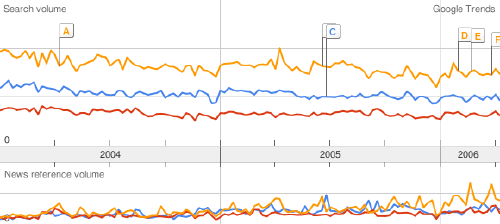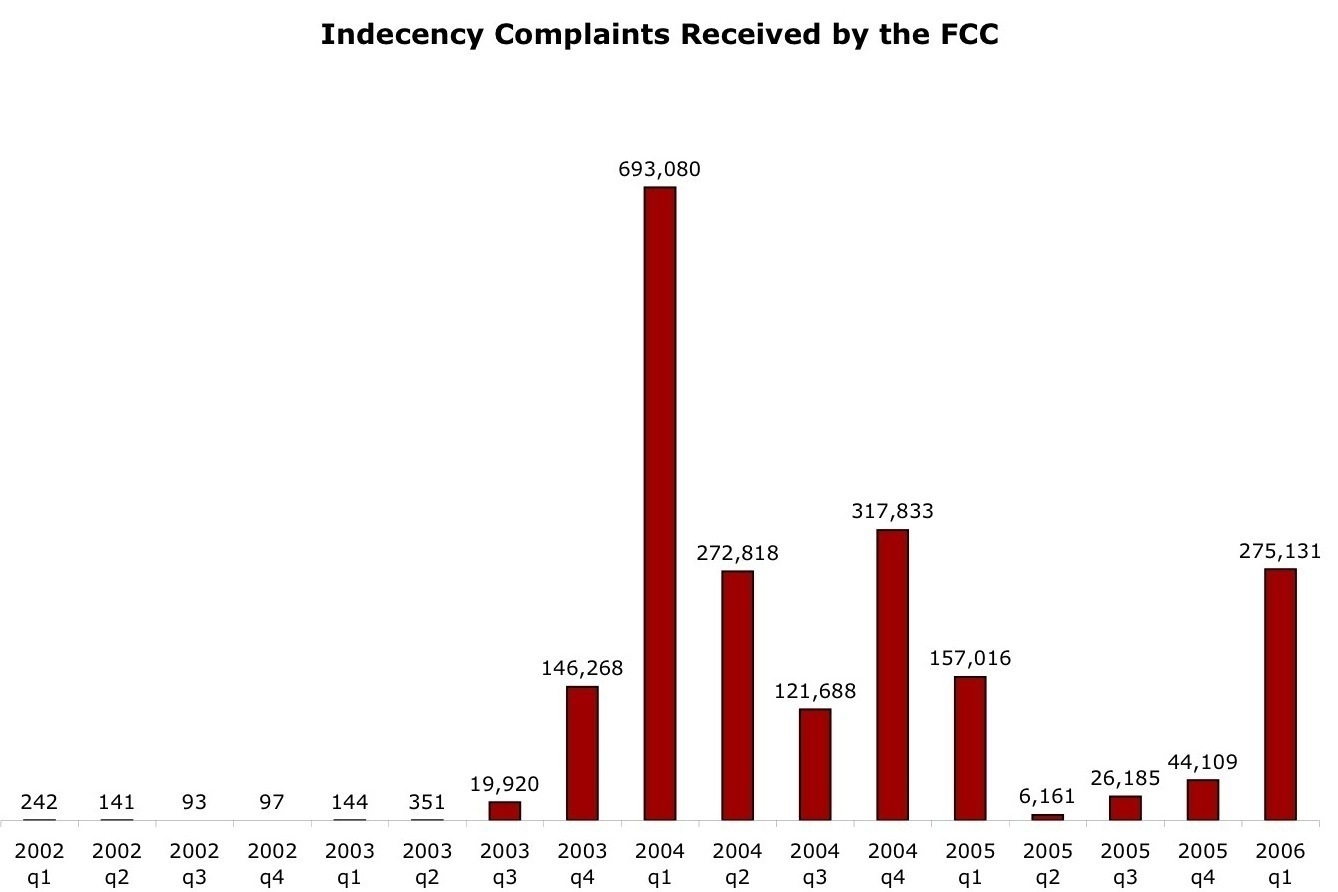Last week, the FCC released its latest three rulings concerning indecency regulations:
- Complaints Regarding Various Television Broadcasts Between February 2, 2002 and March 8, 2005. (FCC 06-17, Mar. 15, 2006)
- Complaints Against Various Television Licensees Concerning their December 31, 2004 Broadcast of the Program “Without A Trace” (FCC 06-18, Mar. 15, 2006)
- Complaints Against Various Television Licensees concerning their February 1, 2004 Broadcast of the Super Bowl XXXVIII Halftime Show (FCC 06-19, Mar. 15, 2006)
With the Omnibus Order, the FCC has attempted to provide broadcasters some guidelines about the scope of the indecency and profanity standards as well as the formula the Commission uses to assess forfeitures. The Commission proposed forfeitures for six programs. Furthermore, the Commission found an additional four broadcasts indecent and/or profane, but declined to propose a forfeiture because those broadcasts occurred between the initial Golden Globe ruling, which indicated that a single, exclamatory use of the word “fucking” would not violate indeceny regulations, and the subsequent ruling that reversed that decision.
The Golden Globes Rulings
During the “Golden Globes Awards” broadcast in January 2003, U2 singer Bono uttered the phrase “this is really fucking brilliant” while accepting an award. In response to complaints, the FCC Enforcement Bureau ruled that such a use– a single use of the word as an intensifier– does not rise to the level of indecency. Golden Globes I. This decision was consistent with previous FCC rulings, but led to a vocal critique of this approach to indecency by those members of the public and members of Congress who support stringent regulations on broadcast indecency.
The Commissioners reevaluated the ruling and used the opportunity to reevaluate the Commission’s entire approach to isolated or fleeting broadcasts. The Commission decided that even a single utterance of certain words can make a broadcaster liable for violating indecency regulations. Golden Globes II “While prior Commission and staff action have indicated that isolated or fleeting broadcasts of the ‘F-Word’ such as that here are not indecent or would not be acted upon, consistent with our decision today we conclude that any such interpretation is no longer good law.”
While prior indecency rulings found that isolated and accidental uses of an expletive were not worth sanctioning, under the Golden Globes II standard, a single use of the “f-word” may be considered indecent, because it is “one of the most vulgar, graphic and explicit descriptions of sexual activity in the English language” and its use “invariably invokes a coarse sexual image.”
The FCC stopped short of declaring any utterance of “fuck” to be per se indecent. Rather, the Commission based its ruling on a “reasonable expectation” test, made possible by the current technologies available to broadcasters. If a broadcast licensee should have a reasonable expectation of a live broadcast containing indecent or profane speech, the licensee is required to take measures to ensure that a single instance of indecent or profane language does not reach the public airwaves. In addition to finding that the Golden Globes broadcast violated the prohibition on broadcast indecency, the Commission ruled that the broadcast of Bono’s statement also ran afoul of the prohibition on broadcast profanity.
This post will discuss only the standard for determining what speech is indecent and not on the other part of the ruling– where the Commission discusses the forfeiture procedure. Writers and performers, not just broadcasters, are affected by these rules. The standard for indecency has significant implications for whether broadcast can be a medium for discussion of serious issues as well as a direct effect on the form and content of creative works not only intended for broadcast, but that may be repurposed and end up on broadcast at some point in the future.
The Indecency Standard
In order to be subject to indecency regulation, the subject material must fall within the scope of indecent content. That is, the material must “describe or depict sexual or excretory organs or activities in terms patently offensive as measured by contemporary community standards for the broadcast medium.”
Violence
Broadcast violence may be disturbing and offensive, but it can not be indecent, because the Commission’s definition of indecency extends to sexual and excretory organs and activities. The Commission dismisses a complaint about an episode of “Medium,” where, during a therapist session between a husband and wife, “the husband stands up and faces the wife… pulls out a gun from his waist and shoots his wife in the face” can not be indecent, because there is no description or depiction of sexual activities.
So, the most violent scenes from, say, The Sopranos could be broadcast without the threat of indecency fine, so long as the scenes do not contain sexual content or foul language, while a less disturbing and even comic scene could give rise to indecency liability for the broadcaster because of language or the depiction of sexual organs or activities.
Single Use Standard
With the omnibus order, the Commission affirms the Golden Globes II rule that a single use of the word “Fuck” is sufficient to be both indecent and profane. The Commission expands the rule, holding that “a single use of the word ‘shit’ and its variants” is both indecent and profane.
Because of the “core meaning of the ‘F-Word,’ any use of that word inherently has a sexual connotation and falls within the first prong of [the Commission’s] indecency definition.” Because the core meaning of the word shit (and its derivatives) refers to excretory activities, using this same logic, any use of the word falls within the scope of the indecency definition.
Patently offensive
The second prong of the indecency determination is whether the material is patently offensive by contemporary community standards. In determining whether material is patently offensive, the Commission considers “the full context in which the material appeared is critically important.” Three factors are cited as the most significant:
- the explicitness or graphic nature of the description
- whether the material dwells on or repeats at length descriptions of sexual or excretory organs or acticities; and
- whether the material panders to, titillates, or shocks the audience
These three factors are not exclusive. The Commission may take into account other relevant considerations. A broadcast does not have to include all three factors to be found indecent. A single inherently sexual or excretory word (e.g. fuck or shit) or brief image may give rise to indecency liability without dwelling on that word or image.
Language
With some exceptions, almost any use of the words “fuck” or “shit” will make broadcasters liable for violating indecency standards. The Commission found public broadcaster KCSM violated indecency regulations by airing part of Martin Scorsese’s “The Blues: Godfathers and Sons.” The Commission found that the use of repeated foul language was not necessary to express any particular viewpoint of an interview subject in the documentary. Instead, the repeated use of “vulgar, explicit, graphic” language is actionably indecent.
The Commission found uses of the word “shit” and its derivatives– including “bullshit,” “bullshitter,” and “owl shit”– to be actionably indecent.
Where the broadcaster has knowledge concerning the use of the foul word, the broadcaster must take reasonable steps to prevent the broadcast of that word. Based on the Golden Globes II ruling, an exclamatory use of “vulgar sexual and excretory terms” during a live broadcast is actionable indecency. A broadcaster can avoid the indecency violation by simply “airing the show on a delay sufficient to ensure that all offending words are blocked.” Children are apparently very likely to watch the broadcast of an awards show, so broadcasters are required to make efforts to avoid airing even spontaneous outbursts of indecency.
The Commission did not propose forfeitures for the Fox broadcasts of the 2002 and 2003 Billboard Music Awards because broadcasters were not on notice that such content would violate indecency standards. These broadcasts occurred after the Commission ruled that an exclamatory use of “fuck” was not indecent, but before the Commission overruled its earlier decision in the Golden Globes II ruling.
Nicole Ritchie in 2003: “Have you ever tried to get cow shit out of a Prada purse? It’s not so fucking simple.”
Cher in 2002: “People have been telling me I’m on the way out every year, right? So fuck ’em.”
A single use of the word “fuck” is not, however, indecent where the use is not part of the primary expression of the broadcast. Where the word appears on the side of a train, out of focus and in the background, that use is not graphic or explicit. The Commission found that a broadcast of “The Amazing Race” which contained this scene for three seconds was not indecent, because the image is not patently offensive.

Even numerous and repeated uses of foul language may not be indecent. The Commission received “numerous complaints” about a 2004 episode of “The Oprah Winfrey Show” that focused on the movie “Thirteen,” teenage sexual practices and slang. The Commission found that the lengthy discussion and explanation of terms like “a tossed salad” was not indecent. The language was in the context of a segment “The Secret Language of Teens” with an educational purpose (teaching parents about the otherwise innocuous language teens use to describe explicit sexual acts) and not to pander, shock or titillate.
The use of words that are not derived from “fuck” and “shit” will generally not violate the indecency standard. “Hell,” “bitch,” “slutty” and “damn” do not refer to sexual or excretory organs or activity and are outside the subject matter scope of indecency. “Dick,” “dickhead,” “ass,” “up yours,” “my ass is huge,” “wiping his ass,” “fire her ass,” and “pissed off” are not sufficiently vulgar, graphic or explicit to support a finding of patent offensiveness.
Depiction of Sexual Activities
Even where nudity is obscured by pixellation or clothing, on-screen depictions of sexual activity may be sufficiently graphic to be indecent.
An episode of “The Surreal Life 2,” included a 10 minute sequence depicting a pool party that Ron Jeremy, “a veteran actor in pornographic movies,” threw for “twenty of his friends in the pornographic movie industry.” Even though nudity was obscured by pixilation, it is “unmistakable that partygoers are exposing and discussing sexual organs as well as participating in sexual activities” in the full context of the scene, which dwells on sexual organs activities and panders to, titillates and shocks the audience.
“Close-up shots of thong-clad buttocks, breasts and crotches, as well as females fondling their breasts, buttocks and genital areas while they dance, gyrate, and fondle one another in a sexually suggestive manner” in a Spanish-language music video are indecent because they are explicit and graphic, repeated, pandering and titillating.
While female cartoon characters dancing in lingerie falls within the subject matter of the indecency standard, a Simpsons episode containing such images is not indecent. The episode is not sufficiently graphic and explicit. “No cartoon character is shown completely nude, and there are no clear depictions of physical contact involving the cartoon character’s sexual organs in the scene.”
Where only a mere insinuation of sex is shown, as in a 2005 episode of “Alias” or a commercial for Golden Phoenix Hotel & Casino, such insinuation is not sufficiently graphic and explicit to be considered indecent. Broadcasting a fully-clothed football player who pretends to “moon” the crowd after scoring a touchdown is not graphic or explicit. The celebration is not dwelled upon and the broadcast and is not indecent.
The Spanish language movie “Con El Corazón En La Mano,” is found indecent, because it depicts “a woman being savagely attacked and raped in a public restroom.” Even though the participants remain clothed, the sexual nature of the scene is unmistakable. The intensity, length and violent nature of the scene make it shocking and disturbing enough to be indecent.
Depiction of Sexual Organs
The Commission finds indecent a 15 minute segment of the “Fernando Hidalgo Show” (a Spanish-language talk show) featuring and dwelling upon a female guest wearing “an open-front dress, with her nipples covered, but her breasts otherwise fully exposed.” This segment is indecent because of the length of the segment and the fact that the camera angles and zooms focus on the guest’s breasts in order to shock, pander to and titillate the audience. A comedic purpose does not negate a finding of indecency.
Even a brief display of a breast may give rise to indecency liability, if such a display is part of a performance which “discusses or simulates sexual activities” in order to pander to, titillate and shock the viewing audience.
An episode of “Will and Grace” includes a number of scenes where various characters “appear to touch Grace’s breast area.” Because it is “primarily to enhance her appearance during her date rather to elicit a sexual response,” this broadcast is neither graphic nor explicit and therefore not indecent.
Non-sexual references to or displays of sexual organs are not indecent if they do not shock, pander or titillate.
Grabbing a man’s genitals to perform a hernia check or to help the man hit the nigh notes while singing the national anthem is not indecent. (It may not be funny, either, but that is, fortunately, outside the scope of the Commission’s jurisdiction.) When not used to shock, pander or titillate, repeated uses of the word “penis” and euphemisms for that word are not indecent when discussing the organ in the absence of explicit or graphic descriptions or depictions.
The brief display in “The Today Show” of a man’s penis during news footage of a rescue from a flood is not indecent. The overall focus of the scene was on the rescue attempt. The Today Show scene is neither explicit nor graphic and does not dwell upon the images of a sexual organ. This may be distinguished from In re: Young Broadcasting of San Fransisco, where a broadcast featuring “Puppetry of the Penis” was ruled indecent, because that segment focused and dwelled on the performers’ genitalia.



























